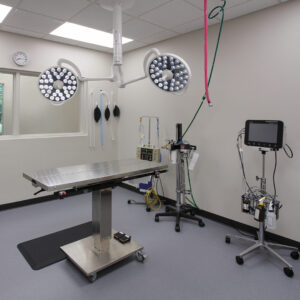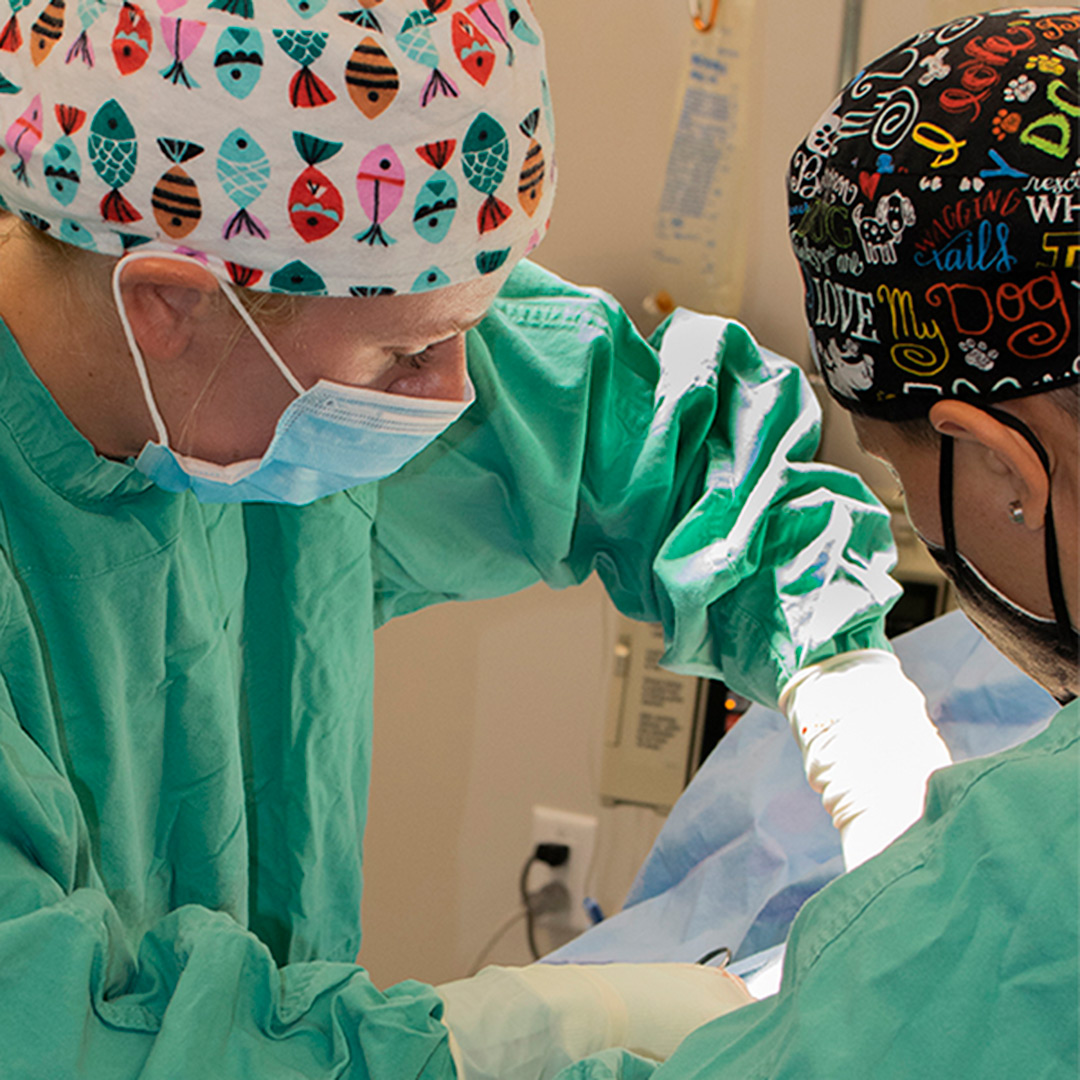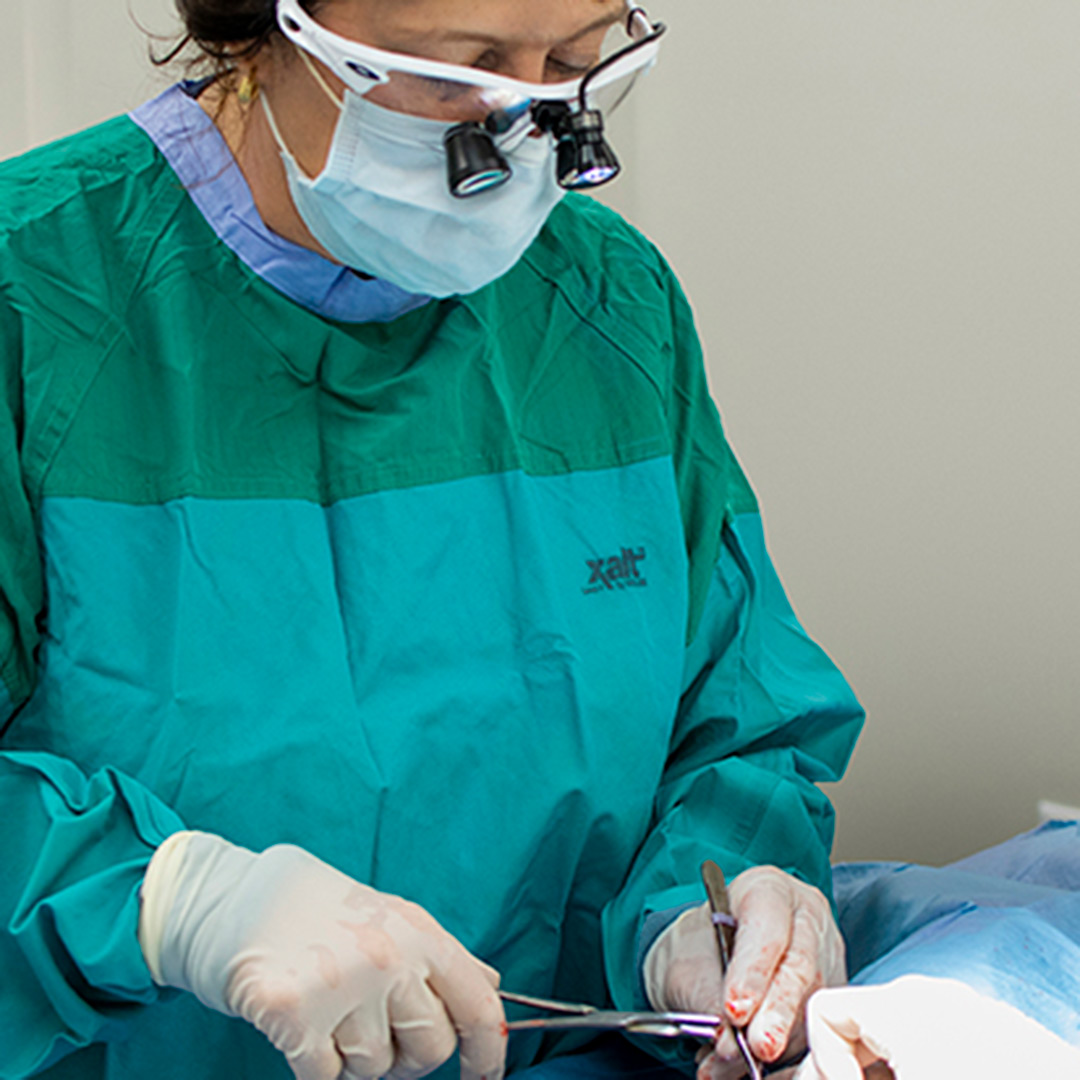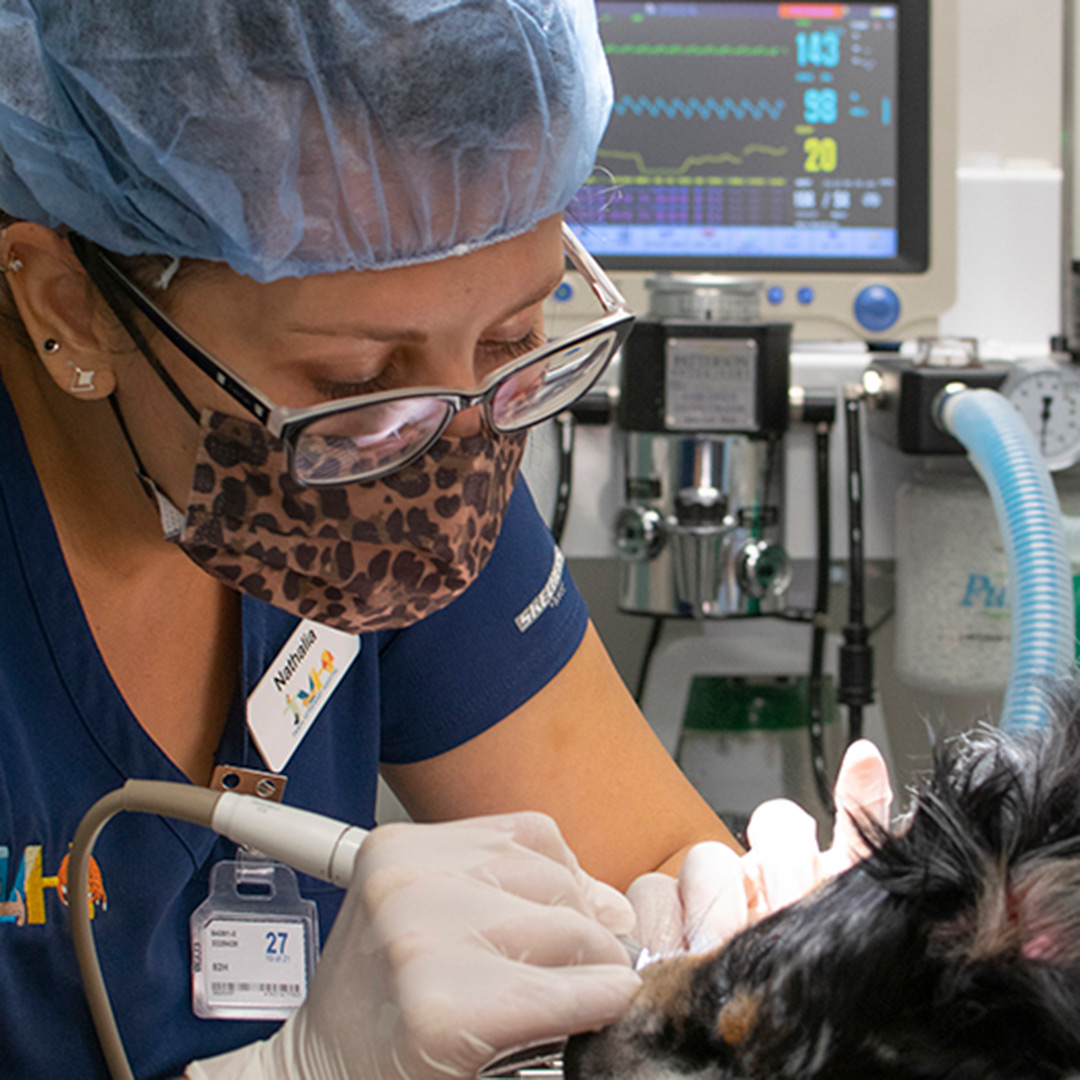At Tampa Veterinary Hospital, we offer a state of the art surgical suite equipped with the latest technology, staffed by highly skilled and trained team members. Our veterinarians have more than 60 years combined experience in performing a wide variety of both simple and highly-complex surgeries. Some of the surgical procedures we offer include: Spay/Neuter, Exploratory Surgery, Mass Removals, Bladder Stone Removal, Enucleations, Amputations, Wound Repair, Eyelid Surgery
 Any surgical procedure done on your pet is a cause for concern. Pets must be sedated and put under general anesthesia for any surgical procedure. Although the risk for complications for most surgeries is low, we take every precaution to minimize each potential risk, even for the most routine procedure. We know how much you love your pet, and you want them to be safe and comfortable before, during and after their surgery. The list below outlines what is included in each surgical procedure that takes place at Tampa Veterinary Hospital. We offer all of this because your pet deserves the best care.
Any surgical procedure done on your pet is a cause for concern. Pets must be sedated and put under general anesthesia for any surgical procedure. Although the risk for complications for most surgeries is low, we take every precaution to minimize each potential risk, even for the most routine procedure. We know how much you love your pet, and you want them to be safe and comfortable before, during and after their surgery. The list below outlines what is included in each surgical procedure that takes place at Tampa Veterinary Hospital. We offer all of this because your pet deserves the best care.
Pre-Surgical Exam
At TVH, each pet is given a thorough exam before their surgery. This is to ensure there are no undetected issues that could cause complications during their procedure or recovery. These could be cardiac, pulmonary, respiratory or neurological issues. The only exception to this is emergency surgery when a full physical exam is not possible.
IV Fluids
As part of the procedure, we will use Intravenous Fluids to keep your pet properly hydrated. This allows your pet to recover faster. In combination with the anti-nausea medications we provide also prevents the possibility of vomiting during recovery.
Pre-Anesthetic Bloodwork
The majority of healthy pets handle general anesthesia with no problems. Unfortunately, a thorough physical examination can not give us a guarantee that a pet will not have an adverse reaction to anesthesia. To ensure that your pet will handle the anesthesia, we require bloodwork to be performed to make sure your pet is a good candidate for their surgical procedure. The tests we run may vary based on the age and procedure being done on your pet, but as a general rule we will run one of two tests; a 6 panel chemistry and CBC (complete blood count) and chemistry or a 12 panel chemistry/CBC. These tests can indicate:
Total Protein Panel Chemistry/CBC
- Alanine Aminotransferase (ALT): Liver enzyme that becomes elevated with liver disease or injury
- Alkaline Phosphatase (Alk Phos): Mainly a liver enzyme which can be elevated due to liver disease, Cushing's disease, steroid therapy, cholestasis, etc.
- Blood Urea Nitrogen (BUN): High levels indicate kidney disease or dehydration. Low levels can be associated with liver disease.
- Creatinine: High leves can indicate kidney disease, dehydration, or urinary tract obstruction
- Blood Glucose: High levels can indicate diabetes mellitus. Low levels can indicate infection, hypoglycemia, liver disease, and certain tumors.
Anti-Nausea Medication prior to Surgery
Part of most any surgery protocol, including ours, is to administer pain medications prior to the procedure. Both dogs and cats have a propensity to vomit due to the medications, the stress of being prepped for surgery, or a combination of the two. We use an FDA approved drug called Cerenia, which is highly effective in controlling nausea which prevents vomiting in both dogs and cats.
What does this mean? Your pet will be more comfortable both before and after surgery. It has also been shown that pets treated with Cerenia pre-surgery begin eating normally more quickly- and food can be an important part of the recovery process from a surgical procedure. In fact, most families report their pet went home after surgery and ate a normal meal almost immediately.

12 Panel Chemistry/CBC
Alanine Aminotransferase (ALT): Liver enzyme that becomes elevated with liver disease or injury
- Alkaline Phosphatase (Alk Phos): Mainly a liver enzyme which can be elevated due to liver disease, Cushing's disease, steroid therapy, cholestasis, etc.
- Blood Urea Nitrogen (BUN): High levels indicate kidney disease or dehydration. Low levels can be associated with liver disease.
- Creatinine: High levels can indicate kidney disease, dehydration, or urinary tract obstruction.
- Blood Glucose: High levels can indicate diabetes mellitus. Low levels can indicate infection, hypoglycemia, liver disease, and certain tumors.
- Total Protein: An abnormal level can indicate several problems such as dehydration or disease of the liver, kidney, or intestinal disorders.
- Albumin: this is a protein produced by the liver. Low levels can indicate chronic liver, kidney, or intestinal disorders.
- Amylase: Elevated values can indicate pancreatitis. Low levels can indicate lack of production of this pancreas enzyme.
- Calcium: Increased levels can indicate disease of the parathyroid gland, kidneys, or certain tumors.
- Phosphorus: Elevated value can indicate kidney disease.
- Total Bilirubin: This level can indicate liver disease or help characterize anemia.
- Cholesterol: This value can be elevated with a variety of disorders including hypothyroidism, liver disease, and kidney disease.
- Packed Cell Volume (PCV): This indicates the amount of red blood cells in whole blood. A low value indicates anemia.
- Complete Blood Count (CBC): this provides information about your pet's white blood cells, red blood cells, and platelets. Abnormalities on this panel may indicate an anemia, bleeding disorder, infection, leukemia, inflammation, etc. If an anemic or low platelet count is present, your pet could experience serious surgical complications.
- Electrolytes: This includes sodium, potassium, and chloride; the balance of these is vital to your pet's health. Abnormal values can be life-threatening to your pet. We use this test to evaluate vomiting, diarrhea, dehydration, and cardiac symptoms.
When these tests are complete, our Doctors will analyze the data, and ensure the proper anesthesia protocols are used. Small adjustments to medications or types of anesthesia may be made based on your pet's results.
To be clear, a recent study showed that complications from anesthesia occurred less than 1% of the time in both dogs and cats. But when that 1% happens to be your pet, the ounce of prevention is worth a pound of cure.
Intravenous Catheter
We administer IV sedation medications to allow us to put your pet under gas anesthesia.
As with any surgery, there can be unforeseen risks. Despite the examinations, tests and other precautions, sometimes a pet just doesn't respond well while under anesthesia. In the event that something goes wrong, we place an Intravenous Catheter so we have access to a vein to administer drugs immediately. We rarely, if ever need to use it. Despite the combined decades of experience between all of our Doctors and all of the expertise, we feel more comfortable with this extra safety feature for your pet's well-being.
Anesthesia Monitoring
All of our pet nurses (we call them technicians in the veterinary industry) have years of experience both in and out of surgery. They have the in-depth training needed to monitor your pet's vital signs while they are under anesthesia. They constantly are checking oxygen levels, blood pressure, temperature, heart rate, and ECG to ensure your pet is stable. This is their only job while the doctor is concentrating on your pet's surgery. If necessary, other technicians are assisting the doctor with instruments or other needs.

Sterile Instruments
Each day, our team uses a special piece of equipment to sterilize all of our instruments. This equipment is called an autoclave. It uses high-heat and steam to kill any germs or bacteria which cannot be killed during the normal washing of the instruments following surgery. Even our surgeons gowns go through the autoclave process.
You may not believe it, but not all facilities do this. Some 'low-cost' facilities will re-use instruments on multiple pets after putting them in a sanitizing solution. Sanitizing is not the same as sterilizing. Would you allow your doctor to perform surgery on a family member if the instruments were not sterilized? Neither would we, and we know your pet is part of your family.
Post-Surgical Monitoring
We usually require pets who have undergone a surgical procedure to stay with us for the majority of the day, sometimes overnight, depending on the procedure. Our highly trained staff understands the warning signs of pets who are not recovering well. As a matter of fact, the majority of complications from surgery are not from anesthesia, or problems during surgery, but during recovery. That's why it's critical for your pet to be hospitalized with us for hours, or perhaps a day or more so we can ensure there are no complications. Your pet will have a dedicated recovery technician to keep them warm and comfortable following their procedure.
Anesthesia
Our experienced veterinarians will choose from a wide range of medications, selecting the one best suited for your pet's needs. Most surgical patients are placed on isofluorane gas anesthesia for their surgery.
Sedation
It is important to understand the difference between sedation and being under anesthesia. Your pet will need to be sedated before going under general anesthesia. Each pet is different, and the Doctor will carefully select the proper medication before administering the anesthesia.
Pain Management
One of our many goals when we perform surgery is to keep your pet pain free. We use preoperative pain management and local anesthetic blocks to avoid 'wind-up pain'. During surgery, we can give your pet additional pain medications if the doctor deems it necessary.
We will most likely send you home with medications as well as instructions on how to administer them when we meet with you to discharge your pet from the hospital.
Antibiotics
We rarely see pets who like to take pills, especially cats. Most people would prefer to give themselves a root canal instead of giving a cat their medication. Even hiding pills in a treat or other food doesn't always go over very well. We prefer to use a long-lasting injectible antibiotic, which makes it easier on you as well as your pet. Of course, the best part is that your pet is not at risk for infection because they refused to take their medication.
Follow-up care
We will always follow up with you after the surgery to ensure the pet is not suffering from any unforeseen side effects, and to verify the medications are being given according to directions. We will also make sure the incisions look normal and that they are eating, drinking and eliminating normally.
If a medical progress exam was not made at the time of discharge, we will want to make an appointment for one at this time. The medical progress exam is so the veterinarian can evaluate the healing process and remove sutures or staples.

